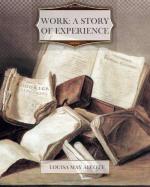“Don’t you never feel that agin, my dear. What’s the Lord for ef He ain’t to hold on to in times of trouble. Faith ain’t wuth much ef it’s only lively in fair weather; you’ve got to believe hearty and stan’ by the Lord through thick and thin, and He’ll stan’ by you as no one else begins to. I remember of havin’ this bore in upon me by somethin’ that happened to a man I knew. He got blowed up in a powder-mill, and when folks asked him what he thought when the bust come, he said, real sober and impressive: ’Wal, it come through me, like a flash, that I’d served the Lord as faithful as I knew how for a number a years, and I guessed He’d fetch me through somehow, and He did.’ Sure enough the man warn’t killed; I’m bound to confess he was shook dreadful, but his faith warn’t.”
Christie could not help smiling at the story, but she liked it, and sincerely wished she could imitate the hero of it in his piety, not his powder. She was about to say so when the sound of approaching steps announced the advent of her host. She had been rather impressed with the “smartness” of Lisha by his wife’s praises, but when a small, sallow, sickly looking man came in she changed her mind; for not even an immensely stiff collar, nor a pair of boots that seemed composed entirely of what the boys call “creak leather,” could inspire her with confidence.
Without a particle of expression in his yellow face, Mr. Wilkins nodded to the stranger over the picket fence of his collar, lighted his pipe, and clumped away to enjoy his afternoon promenade without compromising himself by a single word.
His wife looked after him with an admiring gaze as she said:
“Them boots is as good as an advertisement, for he made every stitch on ’em himself;” then she added, laughing like a girl: “It’s redick’lus my bein’ so proud of Lisha, but ef a woman ain’t a right to think wal of her own husband, I should like to know who has!”
Christie was afraid that Mrs. Wilkins had seen her disappointment in her face, and tried, with wifely zeal, to defend her lord from even a disparaging thought. Wishing to atone for this transgression she was about to sing the praises of the wooden-faced Elisha, but was spared any polite fibs by the appearance of a small girl who delivered an urgent message to the effect, that “Mis Plumly was down sick and wanted Mis Wilkins to run over and set a spell.”
As the good lady hesitated with an involuntary glance at her guest, Christie said quickly:
“Don’t mind me; I’ll take care of the house for you if you want to go. You may be sure I won’t run off with the children or steal the spoons.”
“I ain’t a mite afraid of anybody wantin’ to steal them little toads; and as for spoons, I ain’t got a silver one to bless myself with,” laughed Mrs. Wilkins. “I guess I will go, then, ef you don’t mind, as it’s only acrost the street. Like’s not settin’ quiet will be better for you ‘n talkin’, for I’m a dreadful hand to gab when I git started. Tell Mis Plumly I’m a comin’.”




